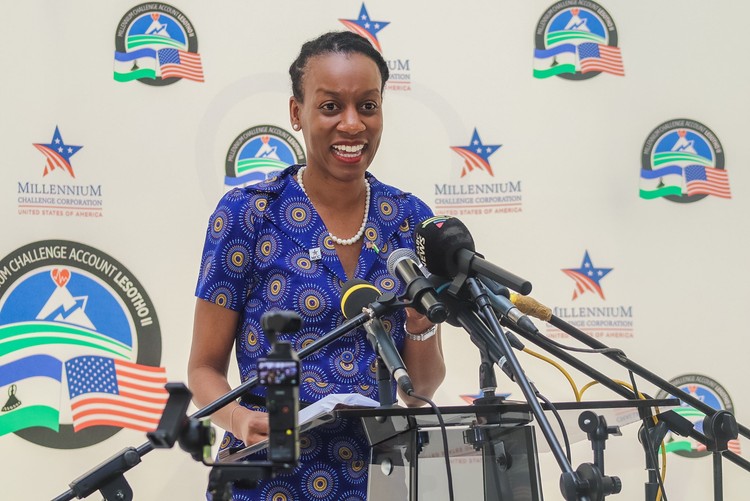US shuts down massive Lesotho development project
R6-billion American-funded Millennium Challenge Account is on the verge of collapse
Millennium Challenge Corporation deputy chief executive Chidi Blyden at the launch of the project in Maseru. Photo: US Embassy in Maseru, copied for fair use.
- The United States has moved to shut down an American-funded R6-billion development project in Lesotho.
- The Lesotho government has not confirmed the closure of the Lesotho Health and Horticulture Compact, but leaked internal emails to staff and contractors show the project is to be closed.
- Launched last year, the Lesotho Health and Horticulture Compact was to benefit approximately 2.5-million people over the next 20 years and generate tens of thousands of jobs.
A 6-billion Maloti (R6-billion) American-funded development project in Lesotho is on the verge of collapse as the United States moves to shut down the Millennium Challenge Corporation (MCC), the agency behind the programme.
Launched last year, the Lesotho Health and Horticulture Compact was to benefit approximately 2.5-million people over the next 20 years and generate over 90,000 direct and indirect jobs over five years.
The Lesotho Health and Horticulture Compact included three projects:
- A $75.4-million health project to improve primary health care and modernise data systems, improve maternal and child health, and support HIV/AIDS treatment;
- A $118.6-million food production project aimed at increasing rural incomes and food security through investments in irrigation; and
- A $62-million project aimed at small businesses, especially owned by women and young people.
According to the 2022 agreement between the MCC and the Government of Lesotho, seen by GroundUp, the US committed $300-million, while Lesotho pledged to contribute no less than $22.3-million over the lifespan of the compact. The Millennium Challenge Account (MCA) was set up to implement the project in Lesotho.
Both the MCA in Lesotho and the Lesotho government have remained silent on the future of the initiative, following the closure of other US-funded programmes. But GroundUp has seen correspondence suggesting that the project is being shut down.
In response to questions from GroundUp, acting chief executive for Lesotho of the Millennium Challenge Account, Limpho Maema, said only that MCC and the Lesotho government were discussing the issue. She said once a final decision had been made, the government would issue a statement.
Foreign Affairs Minister Lejone Mpotjoane referred all inquiries to Finance Minister Retselisitsoe Matlanyane, but she said she was out of the country and too busy to comment.
However, staff on the food production project have been told: “As per an email from Limpho [Maema]… Regrettably, the determination is that the Lesotho Health and Horticulture Compact will be closing”.
GroundUp has also seen correspondence from Maema to contractors saying the same thing. In her email, Maema said services would remain in place “until we have confirmation of a definitive date of closure”.
Contractors to the project include consultants on engineering, horticulture, gender, and business development, as well as auditors and providers of phone services, IT, and vehicles.
Employees of Cowater International — a Canadian consulting firm awarded a $21-million contract in the small business programme — have already been instructed to return company equipment in preparation for shutdown.
In an internal email last week, Cowater Project Manager Antoinette Albisetti told staff to bring laptops and equipment back to the office. “We are now moving all office equipment into storage and looking to tie up loose ends before the end of the month,” she said.
According to the agreement with the US and the Lesotho government, the government must return any unspent funds to MCC.
In Phamong, Mohale’s Hoek — one of the areas earmarked for implementation of the horticulture project — uncertainty now looms large. ‘Maamohelang Tomo, a local villager who served on the land verification committee, told GroundUp that communication about the project has abruptly halted.
“Since we were told to suspend services in January, there’s been no word on the way forward,” she said.
Tomo and her team had been verifying land ownership for fields earmarked for the project. The initial plan included constructing access roads and irrigation dams before moving into crop production. “We had already concluded discussions with landowners, and many had willingly agreed to release their fields,” she explained.
Now, with MCA operations in question, that progress is at risk. “The closure would be a heavy blow. We had made plans based on the payments that we were expecting,” said Tomo.
“The community trusted us because we were the ones meeting with them, persuading them to release their land. Now they come to us, asking for answers, but we have nowhere to turn for information and nothing to tell them.”
A request for comment to the US Embassy in Maseru had not been answered by the time of publication. On previous occasions, the Embassy has referred queries to the US foreign affairs administration in Washington.
Support independent journalism
Donate using Payfast

Don't miss out on the latest news
We respect your privacy, and promise we won't spam you.
Next: Legal Practice Council administrator accused of corruption loses Labour Court bid
Previous: Prisoners can use computers to study in their cells, says Constitutional Court
© 2025 GroundUp. This article is licensed under a Creative Commons Attribution-NoDerivatives 4.0 International License.
You may republish this article, so long as you credit the authors and GroundUp, and do not change the text. Please include a link back to the original article.
We put an invisible pixel in the article so that we can count traffic to republishers. All analytics tools are solely on our servers. We do not give our logs to any third party. Logs are deleted after two weeks. We do not use any IP address identifying information except to count regional traffic. We are solely interested in counting hits, not tracking users. If you republish, please do not delete the invisible pixel.

